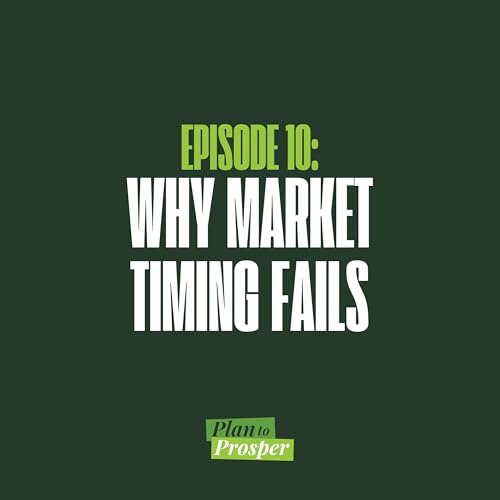
Why Market Timing Fails
Échec de l'ajout au panier.
Échec de l'ajout à la liste d'envies.
Échec de la suppression de la liste d’envies.
Échec du suivi du balado
Ne plus suivre le balado a échoué
-
Narrateur(s):
-
Auteur(s):
À propos de cet audio
Panic is expensive. History shows many of the biggest up days arrive right after the worst ones.
In this episode of Plan to Prosper, we walk through five historic market selloffs and the surprising speed of their rebounds. From Black Tuesday in 1929 to Black Monday in 1987 to the dot-com bust, we show how missing just a handful of strong recovery days can harm long-term results. We talk about loss aversion, the temptation to bail when balances drop, and why diversification and steady stewardship matter. Anchored in Scripture, we encourage a patient, prayerful approach that seeks to honor God with wise planning and resilient investing.
What you’ll learn:
Why negative emotions feel stronger than gains, and how loss aversion fuels bad decisions
How some of the best single days often cluster near the worst days, and why timing them is nearly impossible
What past crashes and rebounds teach long-term investors about staying invested
How diversification across sectors can soften the blow when one area falls hard
- Biblical principles for patient stewardship, including Proverbs 21:5 and Ecclesiastes 11:2
Subscribe for future episodes filled with practical tools and timeless biblical wisdom.
Advisory Services offered through Stonecrop Wealth Advisors, LLC, a registered investment advisor with the U.S. Securities and Exchange Commission. This material is intended for informational purposes only. It should not be construed as legal or tax advice and is not intended to replace the advice of a qualified attorney or tax advisor. The information contained in this presentation has been compiled from third party sources and is believed to be reliable as of the date of this report. Past performance is not indicative of future returns and diversification neither assures a profit nor guarantees against loss in a declining market. Investments involve risk and are not guaranteed.


